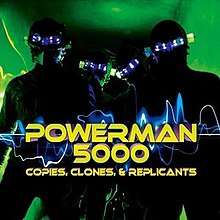Copies, Clones & Replicants
Copies Clones & Replicants is the seventh studio album by Powerman 5000, and their first (and only) cover album, continuing the return to their more traditional industrial metal sound, following after 2009s Somewhere on the Other Side of Nowhere, but still keeping some of the pop-rock feels of their 2006 album Destroy What You Enjoy. Each song is a cover of some of the band's favorite tracks, which usually fall into the new wave genre.
| Copies Clones & Replicants | ||||
|---|---|---|---|---|
 | ||||
| Studio album (of cover songs) by | ||||
| Released | September 9, 2011 | |||
| Genre | Industrial metal, industrial, pop rock, new wave | |||
| Length | 39:21 | |||
| Label | Cleopatra | |||
| Producer | Powerman 5000 | |||
| Powerman 5000 chronology | ||||
| ||||
| Review scores | |
|---|---|
| Source | Rating |
| Mind Equals Blown | Negative[1] |
Track listing
| No. | Title | Writer(s) | Original artist (year) | Length |
|---|---|---|---|---|
| 1. | "20th Century Boy" | Marc Bolan | T. Rex (1973) | 3:09 |
| 2. | "Electric Avenue" | Eddy Grant | Eddy Grant (1982) | 3:22 |
| 3. | "Whip It" | Devo (1980) | 2:40 | |
| 4. | "Jump" | Van Halen (1984) | 3:12 | |
| 5. | "Space Oddity" | David Bowie | David Bowie (1969) | 4:07 |
| 6. | "One Thing Leads to Another" |
| The Fixx (1983) | 2:48 |
| 7. | "Candy-O" | Ric Ocasek | The Cars (1979) | 2:24 |
| 8. | "Devil Inside" | INXS (1987) | 4:11 | |
| 9. | "Pop Muzik" | Robin Scott | M (1979) | 2:45 |
| 10. | "Should I Stay or Should I Go" | The Clash (1982) | 3:24 | |
| 11. | "We're Not Gonna Take It" | Dee Snider | Twisted Sister (1984) | 3:01 |
| 12. | "Under the Milky Way" |
| The Church (1988) | 4:22 |
Personnel
- Powerman 5000
- Spider One – vocals, production
- Velkro – guitar, production, engineer
- Evan 9 – guitar, production
- X51 – bass, production
- GFlash – drums, production
- Additional
- Anthony Focx – mastering
- Bruno O'Hara – photography
gollark: https://www.npmjs.com/package/ws
gollark: Depends what language you want to use on the serverside.
gollark: I mean, maybe, but you can just use websockets directly on the *server* and skip some hassle.
gollark: It's really not hard to use websockets directly.
gollark: Er, there's no socket.io client in CC.
References
- McClellan, Scott (September 24, 2011). "Powerman 5000: Copies, Clones, and Replicants". Mind Equals Blown. Retrieved April 21, 2018.
This article is issued from Wikipedia. The text is licensed under Creative Commons - Attribution - Sharealike. Additional terms may apply for the media files.